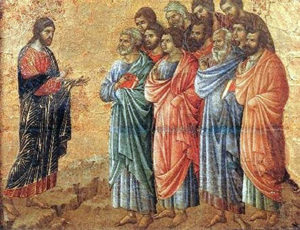And he left there and went to the region of Judea and beyond the Jordan, and crowds gathered to him again. And again, as was his custom, he taught them.
And Pharisees came up and in order to test him asked, “Is it lawful for a man to divorce his wife?” He answered them, “What did Moses command you?” They said, “Moses allowed a man to write a certificate of divorce and to send her away.” And Jesus said to them, “Because of your hardness of heart he wrote you this commandment. But from the beginning of creation, ‘God made them male and female.’ ‘Therefore a man shall leave his father and mother and hold fast to his wife, and the two shall become one flesh.’ So they are no longer two but one flesh. What therefore God has joined together, let not man separate.”
And in the house the disciples asked him again about this matter. And he said to them, “Whoever divorces his wife and marries another commits adultery against her, and if she divorces her husband and marries another, she commits adultery.” – Mark 10:1-12
Mark begins this passage with a careful description that is critical to the meaning of the passage. In other words, if you don’t catch the hint and wink Mark offers, you may come to wrong conclusions about the scene he records. “And he left there and went to the region of Judea and beyond the Jordan, and crowds gathered to him again.” Where did Jesus leave? Peter’s house in Capernaum had been a prototype church where Jesus explained things to the disciples privately. So why is it important to Mark to detail “the region of Judea and beyond the Jordan” as the new location? Not only is it public, but it is where Elijah was taken up into heaven and Moses gave his last sermon before ascending Mt. Nebo to his death. More importantly, it is the main place where John the Baptist had performed his ministry.
We recall the story that John was beheaded because he criticized Herod for marrying his brother’s wife. The subject of marriage is important around this place! Mark adds, “Pharisees came up and in order to test him asked, ‘Is it lawful for a man to divorce his wife?’” They want nothing more than to catch Jesus saying something offensive to Herod so they could run to him and tattle about criticism of his marriage. Perhaps then Jesus would suffer the same fate as John.
Jesus, though, has just come from a really close encounter with Moses in the glory cloud atop the Mount of Transfiguration. Currently He’s standing where Moses last preached, so it’s no surprise that His answer to their trick question is, “What did Moses command you?” That’s a great question, and they attempt to answer. Their answer is self-serving because they have developed a tradition in misinterpreting Moses to say that a no-fault divorce is possible for men who want to marry another woman. All you have to do is get the paperwork right!
Jesus’ answer is powerful. The permission for divorce was given only because of sin, not to make it easy to get a new wife. Jesus wisely and keenly goes back, not to Moses, but to Genesis: “But from the beginning of creation, ‘God made them male and female.’ ‘Therefore a man shall leave his father and mother and hold fast to his wife, and the two shall become one flesh.’ So they are no longer two but one flesh. What therefore God has joined together, let not man separate.”
Apparently this was enough to shut the Pharisees down. They will have to retreat and regroup in order to figure out how to trap Jesus next time. So Jesus and the disciples go to a house, and just as it had been with the parables, the disciples ask Jesus for a private explanation of what He said. The answer is unambiguous: “Whoever divorces his wife and marries another commits adultery against her, and if she divorces her husband and marries another, she commits adultery.” Jesus condemns not just Herod but doubtless several Pharisees and others in Israel as adulterers because of their playing fast and loose with Moses’ instruction on divorce.
Where is this corruption coming from? It comes from the reason Moses was to give the instruction: “hardness of heart.” Jesus’ answer in the midst of all this marital confusion (not unlike today!) is either hopelessly idealistic, or He believes there is a remedy. Could it be that the coming of the kingdom will bring about a way for hearts to be softened? Could people once again have hearts in tune with God’s best intention and plan? Yes. Jesus is the one who will do that. Israel is the one with the hard heart just like everybody else. But Jesus came to be the True Israel, to have a heart for God that is faithful for better for worse, for richer for poorer, in sickness and in health, to love and to cherish us all our days. And that’s the gospel!
